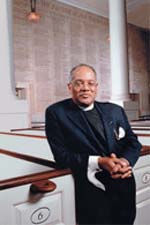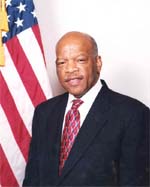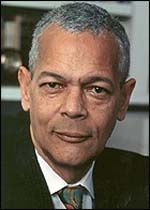
|
|
|
|
Religious & Human Rights Leaders Deplore Constitutional Ploy Support for Such an Amendment is Called' 'A Stain on America' Speaking Out: NAACP, Jewish and Christian Clergy & Congress People for the American Way |
|
Washington, D.C.-Prominent religious representatives, a member of Congress who was an original speaker at the 1963 March on Washington, the Chair of the NAACP and several well-known university professors, have spoken out against supporting an amendment to the U.S. Constitution that would forever prohibit same-sex marriages. Rev. Peter J. Gomes,Plummer Professor of Christian Morals and Pusey Minister in the Memorial Church at Harvard University:
Rabbi David Saperstein: This proposed amendment is a stain on America's promise of equal rights to all...We are all God's children. We are all one people. Let us stop issuing decrees of hatred and begin enacting legislation and implementing policies that will foster healthy, loving, caring, and committed relationships and ensure that in this nation, none will ever again be discriminated against on the basis of sexual orientation or sexual identity. U.S. Representative John Lewis (Democrat, Georgia) and one of the original speakers at the 1963 March on Washington:
Rabbi Sydney Mintz: As a rabbi, I have the right and the honor to stand under the chuppah with a bride and groom and "marry" them, yet I am prohibited by civil law from marrying my own partner. If, as Jews, we have the responsibility to be L'or ha-goyim, "a light unto the nations," shouldn't we illuminate the inherent wrong in denying people the basic right of marriage because of whom they love? Rev. Troy D. Perry, Founder of the Universal Fellowship of Metropolitan Community Churches: As a person of faith, I believe God created some people heterosexual, and other people as gay and lesbian and bisexual and transgender. I also believe, as many faith traditions teach, that all of God's creation is good. If we believe that - really believe that! - how can we settle for second best, which is anything less than full equality under the law? I hear the voices that say, "Change takes time." "Be patient, Troy." "You can't expect politicians to risk their careers over same-sex marriage right." Well, the truth is that the greatest changes in American society have come from bold political strokes. Not incremental change. Think of the Emancipation Proclamation. The Civil Rights Act. The Americans With Disabilities Act. Incremental? No. Bold? Yes.
Rev. William G. Sinkford, President of the Unitarian-Universalist Association: My second point concerns religious liberty and the separation of church and state. I speak to you today from the Channing Pulpit which formerly stood in the old Federal Street Church in downtown Boston. It was at this podium that the leaders of the Commonwealth debated the Bill of Rights of the United States Constitution. The first amendment of that Constitution ensures for Americans that they can profess any religion they choose, or no religion at all. And it guarantees that the government will not privilege one religion over another. In our society, here in Massachusetts and in the rest of this great nation, religious pluralism is a reality. Christians, Jews, Muslims, Sikhs, Baha'is, Buddhists, Taoists, agnostics, and atheists are all citizens of the Commonwealth. The task of our government and elected representatives is not to enshrine the religious point of view of any one faith in our laws; the role of our government is to dedicate itself to protecting the rights of all citizens. It is important to understand the distinction between civil marriage and religious marriage. Allowing gay and lesbian couples to unite in civil marriage will in no way affect the religious practices of any faith community. Read Full Story Henry Louis Gates, Professor, Harvard University: I don't understand why the movement to legitimize gay marriage would bother people so much.... We have to fight to educate people and transform that visceral response...(because) one of the strengths of the black civil rights movement is that it's served as a model for so many other movements. We who have suffered so much should also be the most compassionate. |
 Rev. Peter J. Gomes
Rev. Peter J. Gomes  Rep. John Lewis
Rep. John Lewis  Julian Bond
Julian Bond